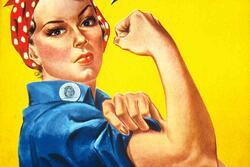For Women in Comedy, A New Jewish Voice
Photograph of comedians Abbi Jacobson and Ilana Glazer by Lane Savage.
Courtesy of Comedy Central.
Jewish women are having a moment. At the end of 2014, Flavorwire published an article entitled “2014 Was—Secretly—The Year of the Jewish Woman.” It profiled Jewish women who made news in culture in the past year: Abbi Glazer and Ilana Jacobson of the Comedy Central show Broad City, Jill Soloway, the writer of the groundbreaking show Transparent, and Jenny Slate, the comedian who starred in the romantic comedy Obvious Child, among others.
There is a range of styles in the work of these modern Jewesses; it can be raunchy, sexy, thoughtful, witty, certainly funny, and certainly Jewish. All of these women possess a sort of feminine Jewish spirit that is completely separated from anything religious. Jewish personhood in culture is nothing new: Woody Allen, Larry David, and Mel Brooks all stand out as cultural powerhouses whose entertainment was always seen as Jewish in nature. But for as much as they represent a Jewish voice, they represent an exclusively male voice. The hallmarks of Jewish humor—witty, cynical, paranoid, self-deprecating, intellectual—were reserved for the male comics, writers, and actors who honed the style.
The new Jewish ladies of comedy are creating a new Jewish voice, one that is distinctly feminist and pushes back against a patriarchal society and a patriarchal religion. Chelsea Handler, Sarah Silverman, Jenny Slate, Ilana Glazer, and Abbi Jacobson, among others, are just as raunchy as their male counterparts and push boundaries in comedy. Sarah Silverman’s comedy in particular has Judaism at its core. Her puppet character Hadassah Guberman harassing a store employee about a lesbian purse ruining her wedding, or her signature joke, “I was raped by a doctor, which is a bittersweet experience for a Jewish girl,” are just some of the examples of how her envelope-pushing comedy is imbued with a Jewish sensibility. At once Jewish, it is also the kind of raunchy material that would make a certain group of Jews furious.
In 2012, a Dallas Rabbi wrote an open letter to Sarah Silverman criticizing her for focusing on her career rather than building a family. He wrote “I think, Sarah, that marriage and childrearing are not in the cards for you because you can’t focus on building life when you spend your days and nights tearing it down.” Sarah Silverman never publically responded, and really she didn’t need to, because her comedy speaks for itself. She said of her Judaism, that she wasn’t “really raised with any religion, we were just Jewish in that it oozed out of our pores” and it does. Her humor is equal parts subverting archaic ideas about what’s proper for a lady and what’s proper for a Jew all while still being branded Jewish and sexy.
On Broad City, there is a scene where Abbi and Ilana enter a subway car full of Hasidic men who make a clear path for them straight down the middle. They slowly and awkwardly work their way down the car and at the end Ilana smacks the butt of one of the men and runs off the car. That scene for me encapsulates what the bold, brassy Jewish women of comedy are doing. Confronting the sexism of the Jewish establishment as well as society at large, and making it all their own.
This piece was written as part of JWA’s Rising Voices Fellowship.






